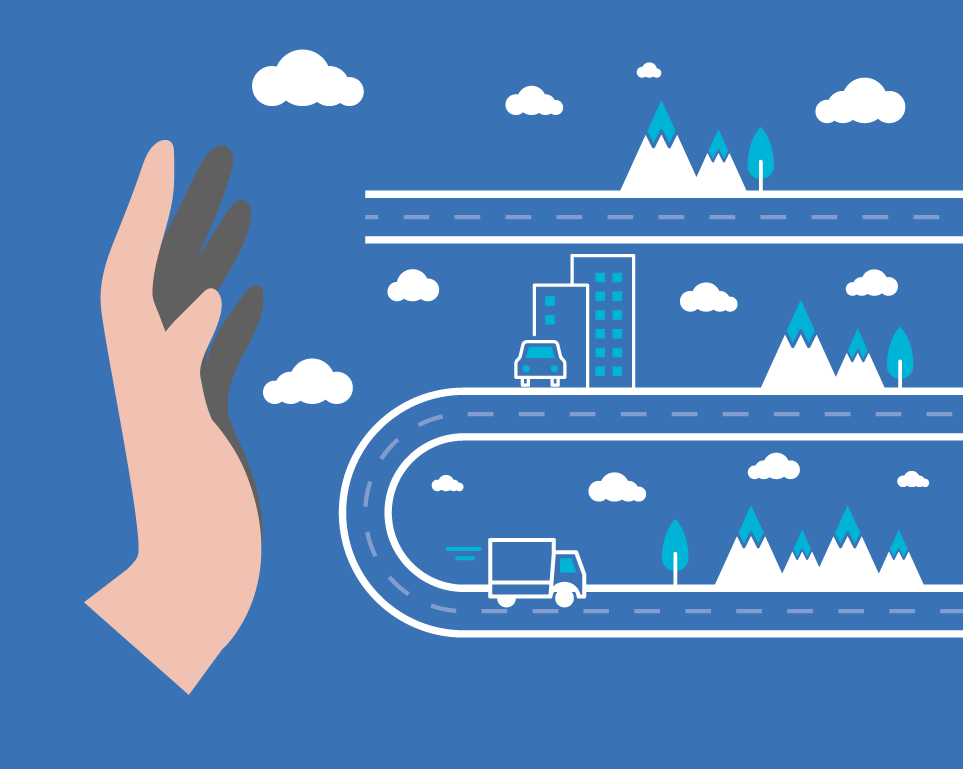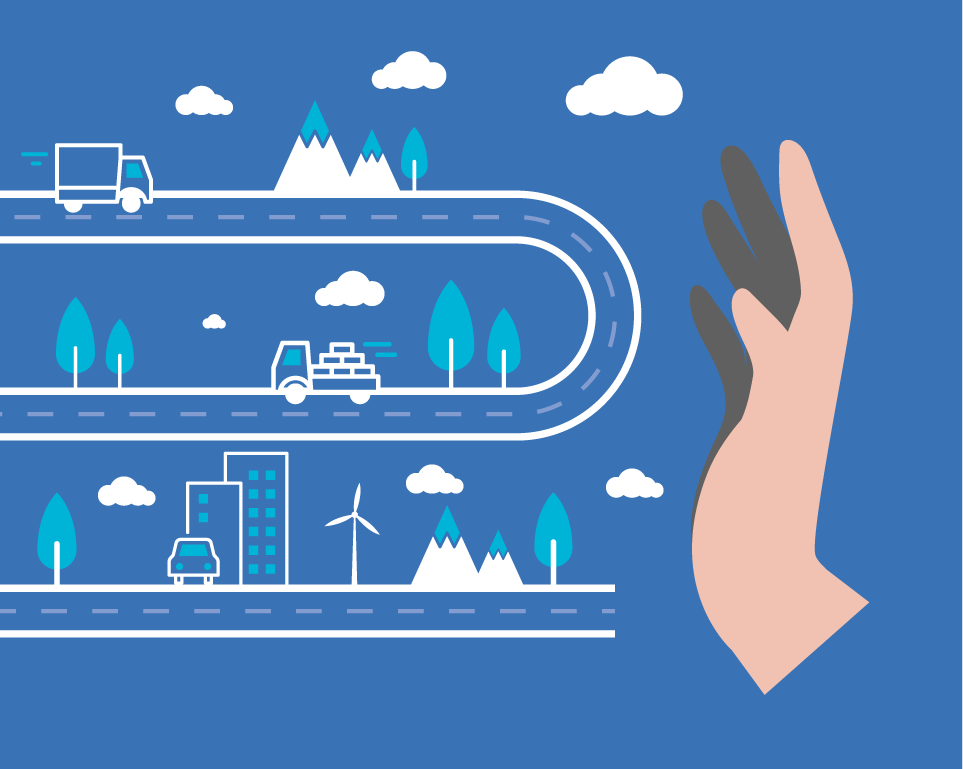We want to be part of the transition to a more sustainable business world and leverage the opportunities that, as a result, markets can offer.
At ROADIS we are aware that sustainability is a strategic tool for generating value and we intend to play an active role in the transition towards a more sustainable business world, taking advantage of the opportunities offered by the different markets.
In this context, in 2020, we launched the company's Sustainability Master Plan, adopting a holistic approach with the aim of integrating it across our business model.


Along the way, we have reflected on the most relevant material aspects for the organisation and our stakeholders.
Our sustainability strategy is aligned with the United Nations Sustainable Development Goals (SDGs) and highlights ROADIS's special contribution to 8 of the 17 objectives.


The Sustainability Master Plan outlines our roadmap; we have identified lines of action in this report that will allow us to work on the most relevant topics for the organisation in terms of sustainability between 2020 and 2022.
Our plan is based on a series of sustainability strategic vectors that, in turn, are subdivided into different themes that form the pillars to achieve integration of sustainability at all levels of the organisation and business.
Our strategic vectors or lines of action in which we work on this sustainable model are:

RESPONSIBLE CULTURE
The vector of responsible culture encompasses all others due to its transversal nature. This vector indicates the total integration of sustainability with our cultural model.
Our purpose is to create value in communities where we operate through profitable investments and the operation of major infrastructure projects across the world.
Our purpose is explained through four attributes:
Prosperity: through our projects we create sustainable value wherever we are. Respecting the environment, we encourage economic development and social growth, creating jobs and connecting people.
Safety: we develop safe infrastructure projects for our employees and customers.
Ethics: we invest and manage projects and adhere to the strictest ethical principles. Our investors and shareholders, authorities, users and employees trust us.
Innovation: Our work is the result of a relentless pursuit of excellence and the drive for innovation. Excellence and innovation goes hand-in-hand in the way that we tackle our business, processes and policies.
At ROADIS we respect, think, speak and behave in accordance with six principles that guide us in our daily work:

GOOD GOVERNANCE AND COMPLIANCE
At ROADIS we are committed to good governance and regulatory compliance: Through our policies, corporate governance and ethics.
In addition, at ROADIS we have a series of policies, procedures and other internal regulations that coordinate our governance model. This allows us to ensure that management of the main aspects of the business is carried out, across all assets, under the same criteria. At the same time, it allows us to closely monitor proper compliance.
Furthermore, we have a well-defined and specialised governance structure to determine the skills and duties of each of the committees that form it.

ENGAGED PROFESSIONALS
At ROADIS we trust our teams and we rely on them to tackle our business challenges.
We work in a transparent and diverse environment which allows us to achieve our shared objectives.
Our staff is our greatest asset, and that's why we put a lot of effort into development towards exceptional performance. Our responsibility as an organisation is to establish clear objectives and to ensure that our team members know the steps necessary to achieve them; this will result in positive results maintained over time.
The health and safety of our employees is another aspect that we have identified as essential in our business management style.
Gender equality is a universal principle that is reflected in many diverse international, European and national initiatives. Although in the infrastructure sector, men have always been over-represented compared to women, ROADIS is working towards a more balanced representation of women in all companies and at all levels of the organisation.

ENVIRONMENTAL CARE
One of the objectives we have identified as fundamental is to minimise the environmental impact of our activity in all companies owned by ROADIS and contribute to the conservation of biodiversity.
That is why we want to contribute by providing everything that is within our reach to keep our environment in the best conditions. We are aware of the potential risks that our activity can generate on the environment; for this reason, we dedicate specific resources to ensure that we respond to these risks in an appropriate manner.
In the spirit of continuous improvement, through a non-financial reporting tool, we are working on standardisation of the report on environmental issues. We focus on materials, resources consumed, and recycling. In this way, we can draw interesting conclusions to improve our operation. For example, paper consumption is monitored, which is used for toll tickets as well as any other use. By controlling this consumption, we will be able to establish, more precisely, appropriate management measures for our business and savings and recycling objectives.
Climate change is one of the most critical challenges we face in the future; at ROADIS we are aware that the consequences could be irreversible if urgent measures are not taken to mitigate their effects.

That is precisely why we have included in our Sustainability Master Plan the vector for environmental care, whose approach is to demonstrate our commitment to the fight against climate change.

Improve our management capacity for natural resources and minimise impacts in the environments in which we operate.

Monitor the exposure of our assets to climate change and promote our resilience to extreme weather events.

CITIZENSHIP PROGRESS
This vector promotes the progress of communities in all the places where we develop our projects.
As reflected in our purpose, we seek to create value in the communities in which we operate through projects to create sustainable value, we promote economic development and social growth, creating jobs and connecting people.
The infrastructure sector has a predominant social component and plays a key role in the three dimensions of sustainable development (economic, environmental and social).
From the jobs created during the construction and maintenance phase; to the capacity of the infrastructure to keep people moving and ensure the flow of goods, services and people; this is how ROADIS contributes to the economic development of the community.
Additionally, infrastructure can have an impact on social welfare, providing regular, balanced and affordable access to essential services for development such as hospitals, schools or markets, etc.
For ROADIS, road safety is one of our priorities. Indicators, objectives and action plans for improving our users' road health and safety -coordinated from the company's operational perspective-are complemented by communication and corporate responsibility actions.
Furthermore, at ROADIS, we are firmly committed to the quality of the services we provide; and with the satisfaction and safety of our users. For this reason, we seek maximum efficiency in the development of our operations and infrastructure, to contribute to user well-being.
Naturally, in 2020, we have expedited the development of our Corporate Social Responsibility strategy
Adapting quickly to the circumstances of the pandemic, which we confronted in the spirit of helping as much as possible the communities in which we operate. And, without hesitation, we will continue to engage in dialogue and participation with local communities, because we are aware that understanding their expectations is what will keep us on the right path.
COMMITMENT TO OUR COMMUNITIES
This year, so marked by the circumstances of the pandemic, we have also developed other initiatives that we have not told you about in the COVID-19 section. Here are some examples of other corporate responsibility programs.
Brazil

Mexico

Europe

India




















